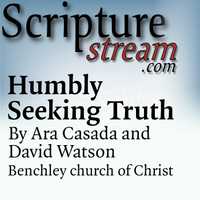-
Attitude check: Luke 9:51-56 – Don’t be so trigger-happy! Have the attitude of Jesus, not of James and John. Our goal should be to help, inform, and encourage others.
-
Does the New Covenant authorize worship with instruments? (continued)
-
Does the Greek word psallo include instruments?
-
Psallo had previously been used in connection with instruments, but its meaning had changed by the time of the New Testament.
-
Ephesians 5:18-19 – If psallo does include instruments, that is part of the command and we all have to use instruments!
-
-
“They worshipped with instruments in the Old Testament.”
-
Yes, but we’re not under the Old Covenant.
-
Psalms 33:1-3; II Chronicles 29:25; Hebrews 7:18-19; 8:6-7
-
Acts 16:3; Galatians 2:3; 5:1-4 – It is wrong to do something as religious service that God did not authorize.
-
-
“Instruments are mentioned in Revelation 5:8; 14:2; 15:2 and 18:21-22.”
-
Literal? This is all figurative language.
-
Heaven is not the same as earth. Matthew 22:30
-
-
-
Didn’t Alexander Campbell start the church of Christ back in the 1800s?
-
Who was Alexander Campbell?
-
Alexander Campbell was a man born in the 1780s in Ireland who came to America in 1809. His father, Thomas Campbell, was a Presbyterian minister, but through independent Bible study Thomas began to see the error of human creeds and denominational confessions of faith. He began having clashes with his denominational peers and broke away.
-
Alexander Campbell followed in his father’s footsteps and encouraged people to use the Bible itself as a religious authority. Many people claim that Alexander Campbell founded the churches of Christ (see his Wikipedia page: https://en.wikipedia.org/wiki/Alexander_Campbell_(clergyman)). Members of the church have been called “Campbellites.” Some say that just like Lutherans originated in Martin Luther, Methodists from John Wesley, etc., members of churches of Christ find their origins in the teachings of Alexander Campbell.
-
-
We can learn several things from Alexander Campbell and his contemporaries.
-
Philippians 3:17; I Corinthians 11:1 – It is good when we can look at others as examples in following Christ.
-
Thomas Campbell originally stated the motto, “Where the Bible speaks, we speak. Where the Bible is silent, we are silent.” That is a good way to sum up some Biblical principles. Galatians 1:6-9; II Timothy 3:16-17; I Peter 4:11; II Peter 1:2-3; II John 1:9; Revelation 22:18-19
-
Like his father, Alexander Campbell tried to distance himself from reliance on human creeds and traditions. In his writings, he repeatedly called for people to simply stick to the New Testament.
-
In 1816, he preached a “Sermon on the Law” based on Galatians 4:21-31 that became well-known, and which changed his relationship with Baptist groups in the area who disagreed with his conclusions that the Old Law had passed away and that we’re under the New Covenant today.
-
Campbell declared in a public debate that “baptism was never designed for, nor commanded to be administered to, a member of the church.” In other words, we are “baptized into one body” (I Corinthians 12:13). We are not members of the body/church, then baptized.
-
-
While Alexander Campbell did some remarkable Bible study and teaching, he was not the founder of Christ’s church! In fact, we could list several beliefs in which he missed the mark.
-
-
DW
January 27, 2019
For further study, see also:
Questions or comments? Join our Discord server for further study.
